Emotions of 'gig workers' in the world as seen from data

The gig workers index: Mixed emotions, dim prospects --Rest of World
https://restofworld.org/2021/global-gig-workers-index-mixed-emotions-dim-prospects/
Rest of World has released an analysis of a survey of 4,900 gig workers working in 15 countries, including Russia, Mexico, India, Brazil and South Africa. As a result of this analysis, although the emotions of gig workers vary from country to country, 'most gig workers want to quit within a year' and 'delivery gig workers have a strong desire to quit.' It turns out that.
The radar chart below is subjective to the questions answered by gig workers who responded to the survey, 'whether they make good money (upper)', 'whether they last long (lower left)', and 'whether they are happy at present (lower right)'. The points are summarized by country. The results vary greatly from country to country. For example, in Russia, 'whether or not you earn well' is close to zero, but 'whether or not it lasts for a long time' and 'whether or not you are happy at present' are perfect scores. In India, 'whether or not you earn well' is a perfect score, and 'whether or not you are happy for a long time' and 'whether or not you are happy at present' are zero points.
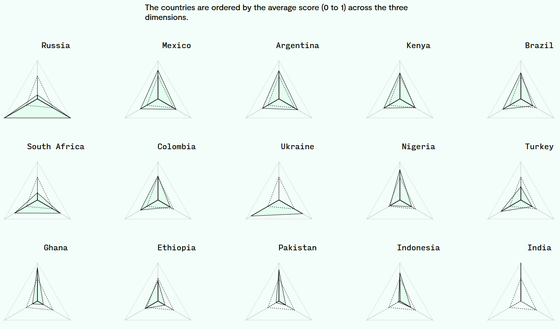
Although the above results vary
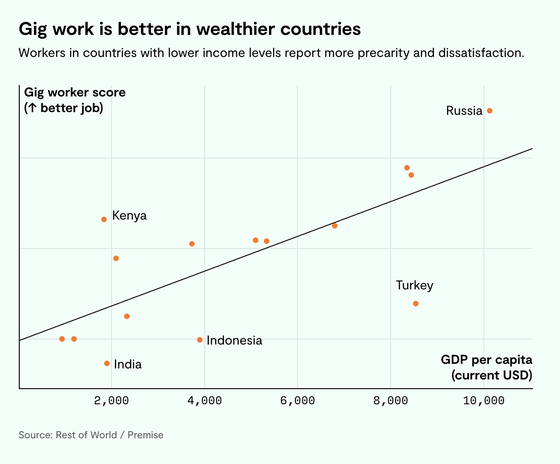
When people say that 'GDP per capita is related to gig worker satisfaction,' they think that 'gig worker dissatisfaction lies in wages,' but the results of this survey suggest that this is not the case. increase. In India, which has the third lowest per capita GDP among the countries surveyed, 69.1% of gig workers answered that they were 'satisfied with their income situation.' Among them, Ethiopia, which has the lowest GDP, has 58%, and Pakistan, which is the second from the bottom, has 65.4%, showing that gig workers in low-income countries are satisfied with their income.
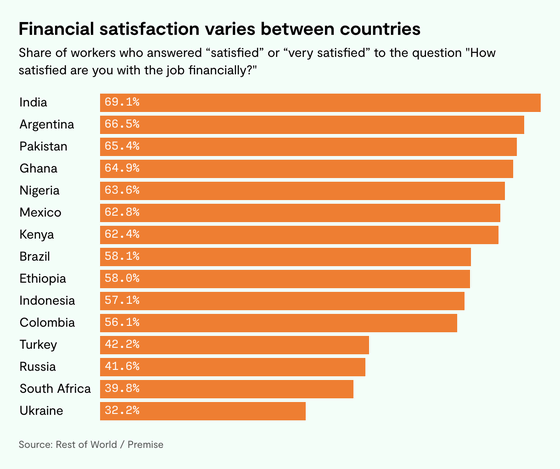
However, research has also revealed that 'the subjectivity and reality of gig workers are different.' Gig workers tend to work long hours, and when converted to hourly wages, about 40% of gig workers earn less than the minimum wage. In the graph below, blue is the average hourly wage of driver, pink is delivery, green is care worker, orange is the average hourly wage of housekeeping gig workers, and the line labeled '1x minimum wage' is the minimum wage. ..
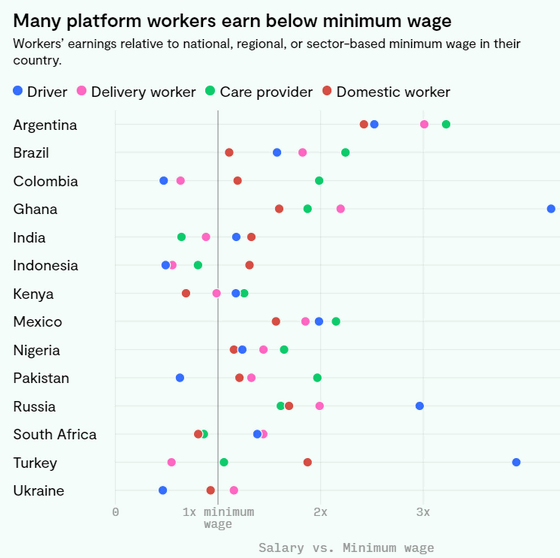
The feelings that gig workers have for their work are as follows. Blue is anxiety (WORRIED), red is anger (ANGRY), yellow is joy (HAPPY), green is sadness (SAD), orange is tired (TIRED), and purple is danger (UNSAFE). The results show that gig workers belonging to the delivery system and vehicle dispatch service system in India are particularly likely to feel dangerous.
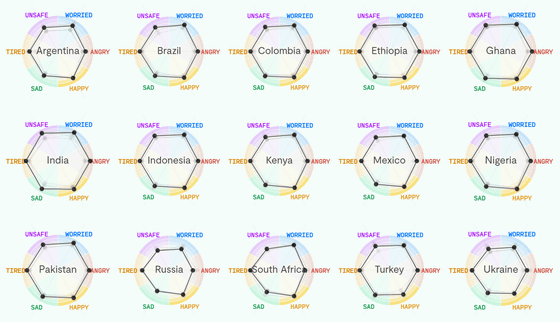
It also shows that the majority of gig workers say they want to quit within a year. Below is the percentage of answers to the question 'How long do you think you will continue to work?', Orange 'quits within a month', light yellow 'quits within a month to a year', and light green 'quits within a month to a year'. The ratio is 'stop within 3 years' and 'continue for 3 years or more' in green. In 14 countries excluding Ukraine, the total of 'quitting within one month' and 'quitting within one month to one year' exceeds 50%.
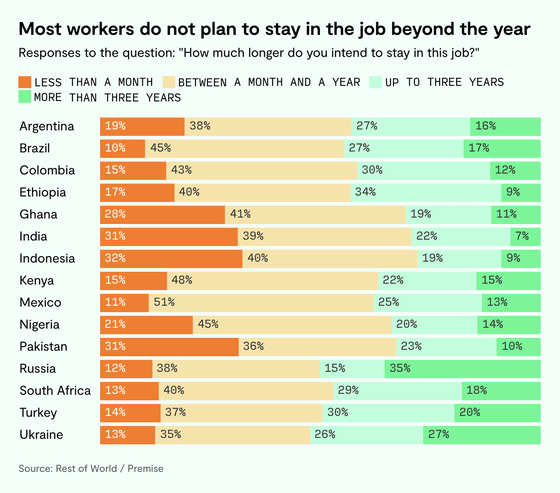
The care worker system is as follows when viewed by occupation.
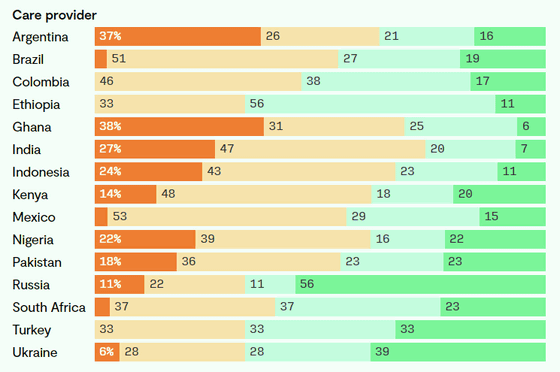
Delivery system
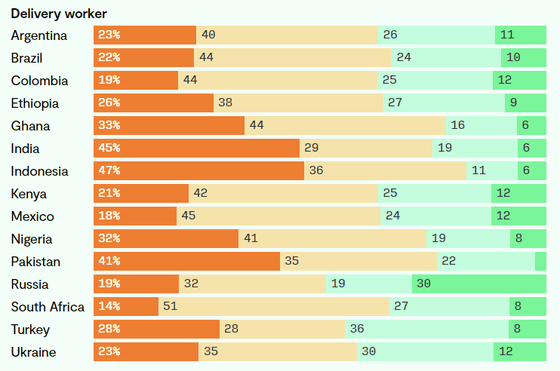
Housekeeping system
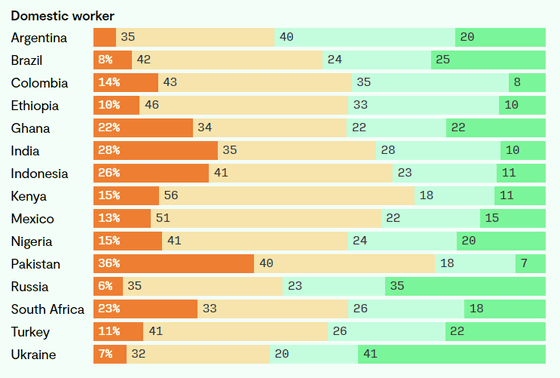
Each driver system looks like this. Rest of World commented, 'Delivery gig workers are more likely to want to quit within a month than other occupations.'
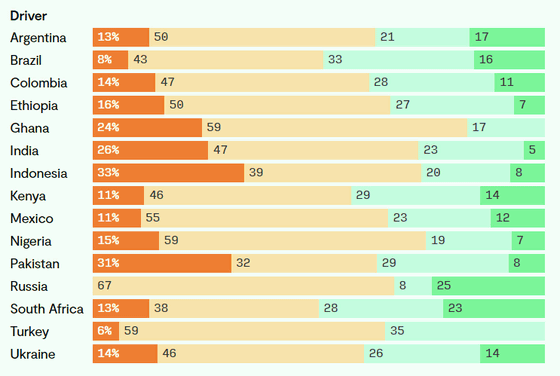
Rest of World also reported a special feature on investment companies promoting gigwork on the same day as the results of this survey. It explains that the SoftBank Group in Japan is investing in an amount that overwhelms other companies.
The investors pushing the gig model around the world --Rest of World
https://restofworld.org/2021/global-gig-workers-investors-behind-gig-work-model/

Related Posts:
in Note, Posted by darkhorse_log







